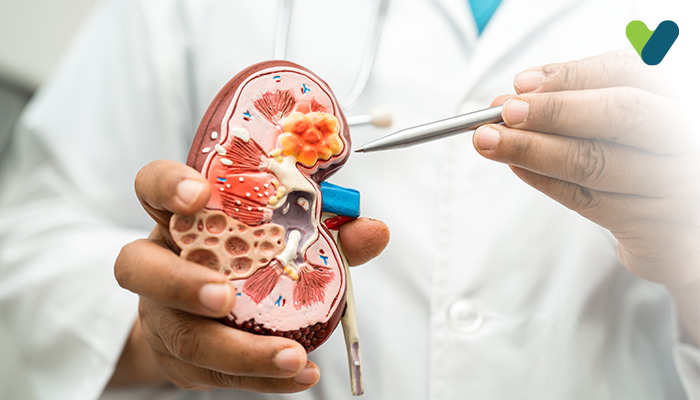The most commonly prescribed kidney test name that doctors recommend is KFT. The kidney function test (KFT test) or RFT test is a group of biochemistry blood tests that determine how properly your kidneys are functioning.
Why is the Kidney Test Performed?
Your doctor will recommend this KFT blood test under certain conditions:- As a part of your regular health checkups
- To diagnose what diseases are affecting the kidneys
- To screen high-risk people who are more prone to develop various kidney diseases
- To monitor the progress of the existing kidney diseases treatment
Test Summary
| Also known as | Renal Function Tests, RFT, Kidney Profile Test, RFT Test |
| Test Type | Imaging |
| Kidney function test includes | Urea, Uric acid, creatinine, Urea/creatinine ratio |
| Preparation | No special preparation |
| Reporting | Within 24 hrs |
| Test price | The price of a KFT test may vary from city to city and lab to lab |
| Also included in | Health Insurance Plans |
| Related tests | LFT, Ultrasound Scan KUB, GFR renal scan, CT scan KUB |
What is a Kidney Function Test?
Kidneys are the pivotal organs of your body and play an array of functions including filtering the blood and separating the waste products from your body. Through urine, the kidneys extirpate the waste products from your body and also, maintain the pH and water balance of the body. The KFT test means Kidney Function Test and it monitors the functions of your kidneys.What Tests are Done to Check Kidney Function?
The KFT test measures the following parameters in your blood.1. Blood Urea Nitrogen (BUN)/ Urea
This test indicates the amount of urea nitrogen present in the blood. Urea is a nitrogenous by-product of the metabolism of protein, and its level in blood portrays the amount of nitrogen present in blood as urea. High BUN levels indicate that you may have kidney diseases, dehydration, and obstacles in the urinary tract due to kidney stones, prostate gland enlargement, etc.Urea is excreted from your blood by the kidneys through urine. Excessive urea in blood is called uremia and may be responsible for various health issues including kidney diseases.
2. Uric Acid
This test also measures the amount of uric acid in your blood. Uric acid is a waste product formed from the breakdown of purines. This is also produced by the metabolism of proteinaceous food, especially red meat. Your kidneys excrete uric acid through urine and a small portion through stool. The uric acid test measures the level of uric acid in the blood and also, indicates whether your kidneys are functioning properly or not.If excess uric acid is present in your blood, then it is called hyperuricemia. Hyperuricemia causes gout disease because uric acid crystals build up in the synovial fluid between joints. Hyperuricemia also forms the lumps of uric acid crystals called tophi under the skin. When these crystals accumulate in the kidneys they can cause kidney stones.
3. Creatinine
This test measures the level of Creatinine in your blood. Creatinine is a waste product that is created from the normal breakdown of muscles in the body. Excess creatinine disrupts the functions of kidneys. Certain foods like eating cooked meat, protein supplements, etc. may enhance the level of creatinine in your blood.4. BUN/Creatinine Ratio
This ratio test compares the levels of nitrogen (as urea in the blood) to the levels of creatinine in the blood. This ratio gives a more accurate picture of kidney function. Low BUN to creatinine ratio can be caused due to several reasons, including a low protein diet, liver cirrhosis, rhabdomyolysis (muscle disease), syndrome of inappropriate antidiuretic hormone secretion (SIADH), pregnancy, and so on.Kidney Function Test Normal Range
1. Urea
- 2.5-7.8 mmol/L
2. BUN
- 7 to 20 mg/dL
3. Uric Acid
- Adult Female: 2.4 to 6.0 mg/dL
- Adult Male: 3.4 to 7.0 mg/dL
- Children: 3 to 4 mg/dL
4. Creatinine
- Adult males: 0.6 to 1.2 mg/dL
- Adult females: 0.5 to 1.1 mg/dL
5. BUN/Creatinine Ratio:
- 12:1 to 20:1
During the Test Procedure
You need to visit your nearby labs or hospitals for tests to check kidney functions. An experienced lab technician will tie up an elastic band around your upper arm to find out your veins. After cleaning the area, the technician will insert a needle through your skin to collect the blood sample. The sample will be kept in a test tube for analysis.The technician will place gauze and a bandage over the puncture site after the test. You may see a bruise or swell around the puncture area over the next few days.


